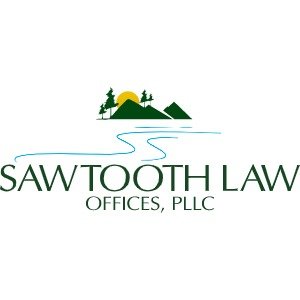Best Financial Services Regulation Lawyers in Boise
Share your needs with us, get contacted by law firms.
Free. Takes 2 min.
List of the best lawyers in Boise, United States
About Financial Services Regulation Law in Boise, United States
Financial Services Regulation in Boise, United States, primarily involves the oversight of institutions that provide financial services to consumers, such as banks, investment firms, insurance companies, and credit unions. These regulations are designed to maintain the integrity of financial markets, protect consumers, and promote stability in the financial system. In Boise, as in other parts of the United States, financial regulation involves federal laws, state specific regulations, and local rules that ensure the fair treatment of consumers and the legality of financial transactions and practices.
Why You May Need a Lawyer
Several situations may necessitate legal assistance in the realm of Financial Services Regulation. If you're part of a financial institution facing compliance issues or investigations by a regulatory body, it is essential to have legal guidance. Individuals may require assistance in understanding their rights when dealing with financial institutions, especially if they suspect unfair practices. Businesses might need help navigating the complex landscape of financial regulations when starting new ventures or when involved in mergers and acquisitions. Legal advice can also be crucial in understanding changes to financial laws or contesting penalties or sanctions imposed by regulatory bodies.
Local Laws Overview
In Boise, several local financial regulatory measures complement federal laws, such as the Dodd-Frank Act and regulations enforced by the Securities and Exchange Commission (SEC) and the Financial Industry Regulatory Authority (FINRA). Idaho's Department of Finance oversees the regulation of state-chartered financial institutions and companies providing financial services in Boise. Local laws focus on consumer protection, transparency in financial products, and preventing fraudulent practices. For individuals and businesses alike, staying informed about local ordinance changes and how they affect financial transactions is crucial for compliance and safeguarding interests.
Frequently Asked Questions
What is the role of the Idaho Department of Finance?
The Idaho Department of Finance plays a pivotal role in regulating state-chartered banks, credit unions, mortgage lenders, and other financial services providers in Boise. The department ensures compliance with both state and federal financial regulations.
How does federal law influence financial regulation in Boise?
Federal laws, including the Bank Holding Company Act, the Fair Credit Reporting Act, and guidelines from the SEC, provide a framework that local financial regulations in Boise must adhere to, ensuring overall coordination and compliance across different jurisdictions.
What are some common compliance issues financial institutions face in Boise?
Common issues often relate to privacy, disclosure, reporting, and anti-fraud measures. Institutions might struggle with adhering to both federal and state-specific requirements, which can lead to investigations and penalties.
How can consumers protect themselves against financial fraud in Boise?
Consumers can protect themselves by staying informed about their financial rights, regularly reviewing their financial statements, and reporting any suspicious activities to regulators like the Idaho Department of Finance.
What should businesses consider when complying with financial regulations?
Businesses should maintain robust internal processes for compliance, routinely audit their practices, and stay updated with regulatory changes to avoid legal ramifications.
Can a lawyer help with implementing a compliance program?
Yes, lawyers specializing in financial regulations can help design and implement compliance programs specific to the needs of your business, ensuring alignment with applicable laws.
What steps should I take if I suspect my bank of unfair practices?
You should gather evidence, understand your rights as a consumer, and consult with a lawyer who can determine the validity of your claims and help you pursue action with the necessary regulatory bodies.
How are disputes between consumers and financial institutions resolved in Boise?
Disputes may be resolved through mediation, arbitration, or litigation, depending on the nature of the issue. It's advisable to seek legal counsel to determine the best approach.
Are there specific regulations for online financial transactions in Boise?
Yes, both federal and state regulations address online transactions, requiring financial institutions to adhere to stringent cybersecurity and privacy standards to protect consumer information.
What impact does the Dodd-Frank Act have on local financial regulations?
The Dodd-Frank Act established comprehensive protective measures that state regulations in Boise often echo, focusing on transparency, consumer protection, and risk management in financial practices.
Additional Resources
Several resources can provide further assistance and information regarding financial services regulation in Boise. These include the Idaho Department of Finance, the Consumer Financial Protection Bureau (CFPB), and local legal aid societies specializing in financial law. Educational materials from these organizations can help both consumers and businesses understand their rights and obligations.
Next Steps
If you need legal assistance in Financial Services Regulation, start by consulting a lawyer with specialized experience in this field. Consider scheduling a consultation to discuss your specific situation and understand the potential legal solutions available. Additionally, staying informed and proactive about your rights can prevent future regulatory issues. Taking timely action and seeking expert guidance are crucial steps to effectively managing any financial regulatory challenges you may encounter.
Lawzana helps you find the best lawyers and law firms in Boise through a curated and pre-screened list of qualified legal professionals. Our platform offers rankings and detailed profiles of attorneys and law firms, allowing you to compare based on practice areas, including Financial Services Regulation, experience, and client feedback.
Each profile includes a description of the firm's areas of practice, client reviews, team members and partners, year of establishment, spoken languages, office locations, contact information, social media presence, and any published articles or resources. Most firms on our platform speak English and are experienced in both local and international legal matters.
Get a quote from top-rated law firms in Boise, United States — quickly, securely, and without unnecessary hassle.
Disclaimer:
The information provided on this page is for general informational purposes only and does not constitute legal advice. While we strive to ensure the accuracy and relevance of the content, legal information may change over time, and interpretations of the law can vary. You should always consult with a qualified legal professional for advice specific to your situation.
We disclaim all liability for actions taken or not taken based on the content of this page. If you believe any information is incorrect or outdated, please contact us, and we will review and update it where appropriate.













